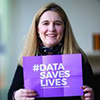The Health Informatics programme has been designed to equip our students for leadership roles delivering change in healthcare.
Health informatics is the study of how information and information technology can transform the organisation and delivery of healthcare. This joint programme with the University of Manchester has been designed to develop a health informatics workforce, in the UK and internationally, able to address today’s challenges and prepare for tomorrow’s.
To find out more information about this degree, such as entry requirements, programme length and cost, visit the UCL prospectus webpage. To hear from our current and former students, visit the study page.
Applications for 2022/23 will remain open from 18th October 2021 to 31st March 2022.
About the course
You will learn about healthcare policy and strategy as it relates to informatics and about the design and implementation of the wide variety of digital systems used in delivering healthcare today. You will be able to tackle the technical details behind different approaches to engineering and implementing these systems as well as understanding how to engender change. You will also acquire skills in analysing and presenting data.
Why study with us?
- The programme is delivered through a collaboration between UCL and the University of Manchester, the two largest teams in this field in the UK.
- The programme is supported by the NHS graduate management training scheme and a wide range of other employers. You will join a cohort with a diverse mix of educational and technical backgrounds, and this shared experience is one of the strengths of the programme.
- The programme is delivered through a mix of face to face teaching and online learning, designed to fit into your working life. Assignments are often relevant to students' working lives and many students complete a dissertation in their place of work
Careers
You will be prepared for technical and management roles leading the digital transformation of healthcare. Graduates of the programme have gone on to leadership roles in the NHS and other healthcare organisations here and overseas. Some of our graduates have moved into roles in industry in pharmaceutical companies or consulting organisations. Others have gone on to further study, taking on PhDs or fellowships while others have launched their own businesses.
Course Content
Please note that the list of modules given here is indicative. This information is published a long time in advance of enrolment and module content and availability is subject to change.
Compulsory modules
- Essentials of Informatics for Healthcare Systems (CHME0025)
- Principles of Health Data Analytics (CHME0001)
- University of Manchester: Health Information Systems and Technologies (XMCH0001)
- University of Manchester: Standards and Interoperability (XMCH0002)
- Dissertation in Health Informatics (CHME0023)
Optional modules
- Personal Health Informatics (CHME0036)
- Digital Transformation Project (CHME0027)
- Learning Health Systems (CHME0010)
- Patient Safety (CHME0037)
- University of Manchester: Decision Support Systems (XMCH0005)
- University of Manchester: Modern Information Engineering (XMCH0003)
- University of Manchester: Usable Systems Design (XMCH0004)
Dissertation/report
All students undertake an independent research project which culminates in a report in the form of a journal article of up to 6,000 words (60 credits).
Examples of past projects:
- The National Early Warning Score 2 as a Predictive Tool for Adverse Events in Cardiac Postoperative Patients
- An Evaluation of Electronic Clinical Infection Disease (elCID) Open Source Software Implemented in an NHS Hospital
- Reviewing Mental Health App Reviews: An Unsupervised Machine Learning Exploratory Study
How is the programme delivered?
The programme is delivered via blended learning. As such, you will be required to attend three days of face-to-face classes per module. The rest of the module will be taught online on the Virtual Learning Environment. Please note some modules are taught through UCL and some through the University of Manchester (UoM).
How is the programme structured?
- MSc
MSc Programme Structure Full-time Y1 Part-time Y1 PT Y2 Modular Flexible (up to 5 years) Y1 MF Y2 MF Y3 8 Modules + DISS 5 or 6 Modules 2 or 3 optional modules + DISS EIHS (C) EIHS (C) + 2/3 optional modules EIHS (C) + 4 optional modules DISS (C) HIST (C) HIST (C) DISS (C) HIST (C) PHDA (C) PHDA (C) PHDA (C) SI (C) SI (C) SI (C) + 4 optional modules + 1 or 2 optional modules DISS (C) C= Compulsory
- PG Dip
Full-time Y1 Part-time Y1 PT Y2 Modular Flexible (up to 5 years) Y1 MF Y2 MF Y3 8 Modules 5 or 6 Modules 2 or 3 optional modules EIHS (C) EIHS (C) + 2/3 optional modules EIHS (C) + 4 optional modules HIST (C) HIST (C) HIST (C) PHDA (C) PHDA (C) PHDA (C) SI (C) SI (C) SI (C) + 4 optional modules + 1 or 2 optional modules OR: OR: EIHS (C) + 4 optional modules EIHS (C) SI (C) + 2 optional modules HIST (C) HIST (C) + 2 optional modules PHDA (C) PHDA (C) SI (C) C= Compulsory
- PG Cert
Full-time Y1 Part-time Y1 PT Y2 Modular Flexible (up to 5 years) Y1 MF Y2 MF Y3 4 C Modules 4 C Modules 4 C Modules EIHS (C) EIHS (C) EIHS (C) HIST (C) HIST (C) HIST (C) PHDA (C) PHDA (C) PHDA (C) SI (C) SI (C) SI (C) OR: OR: EIHS (C) PHDA (C) EIHS (C) PHDA (C) HIST (C) SI (C) HIST (C) SI (C) C= Compulsory
 Close
Close



